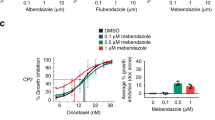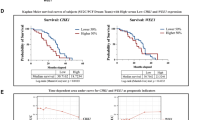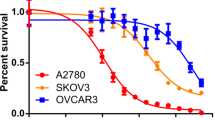Abstract
Cytoplasmic phospholipase A2 (PLA2) is known to be phosphorylated and activated by MAP kinase (Lin et al 1993, Cell 72: 269-278), an important downstream component of signal transduction, whereas paclitaxel has been shown to inhibit isoprenylation of ras proteins (Danesi et al 1995, Mol Pharmacol 47: 1106-1111). Given that quinacrine (Q), a PLA2 inhibitor, and paclitaxel (P) might act at different sites in the cell signalling pathway, our aim was to test whether they were synergistic in combination against prostate cancer cells. Cell viability of PC-3, PC-3M and DU145 cells in 96 - well plates was assessed 96 h after drugs were added concurrently. Using Chou analysis, we demonstrated synergy for the combination against all three cell lines. Further, synergy was present under both conservative (mutually non-exclusive) and non-conservative (mutually exclusive) models. Studies in the nude mouse xenograft model support the finding of synergy in vitro. In DU145-bearing mice, Q (50 mg kg(-1)) and P (0.5 mg kg(-1)) given daily for 12 consecutive days, either concurrently or sequentially, was more effective than either drug alone, at twice the dose intensity. In an enzyme-linked immunosorbent (ELISA) apoptosis assay, arachidonic acid was able to partially reverse Q- and P-induced apoptosis, suggesting PLA2 pathway involvement. Finally, the combination of lovastatin, another inhibitor of ras isoprenylation, and quinacrine had synergistic inhibitory effects on the growth of PC-3 cells in vitro, suggesting that the combination of these two classes of compounds might serve as an attractive therapeutic approach for prostate cancer.
This is a preview of subscription content, access via your institution
Access options
Subscribe to this journal
Receive 24 print issues and online access
$259.00 per year
only $10.79 per issue
Buy this article
- Purchase on Springer Link
- Instant access to full article PDF
Prices may be subject to local taxes which are calculated during checkout
Similar content being viewed by others
Author information
Authors and Affiliations
Rights and permissions
About this article
Cite this article
de Souza, P., Castillo, M. & Myers, C. Enhancement of paclitaxel activity against hormone-refractory prostate cancer cells in vitro and in vivo by quinacrine. Br J Cancer 75, 1593–1600 (1997). https://doi.org/10.1038/bjc.1997.272
Issue Date:
DOI: https://doi.org/10.1038/bjc.1997.272
This article is cited by
-
Quinacrine inhibits cMET-mediated metastasis and angiogenesis in breast cancer stem cells
Journal of Cell Communication and Signaling (2023)
-
Vorinostat and quinacrine have synergistic effects in T-cell acute lymphoblastic leukemia through reactive oxygen species increase and mitophagy inhibition
Cell Death & Disease (2018)
-
Loss of HSulf-1: The Missing Link between Autophagy and Lipid Droplets in Ovarian Cancer
Scientific Reports (2017)
-
Drug discovery in advanced prostate cancer: translating biology into therapy
Nature Reviews Drug Discovery (2016)
-
Beyond DNA binding - a review of the potential mechanisms mediating quinacrine's therapeutic activities in parasitic infections, inflammation, and cancers
Cell Communication and Signaling (2011)



